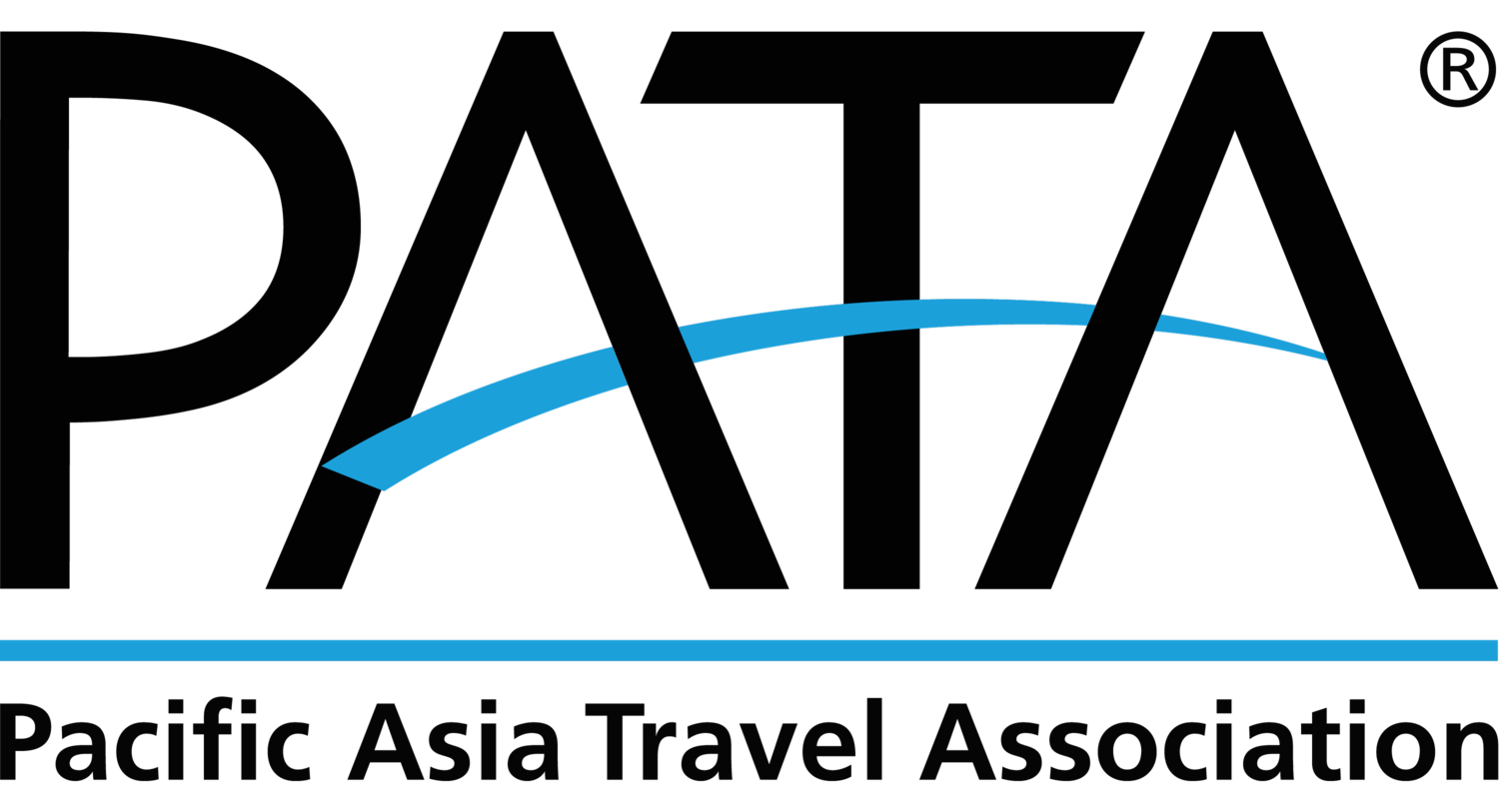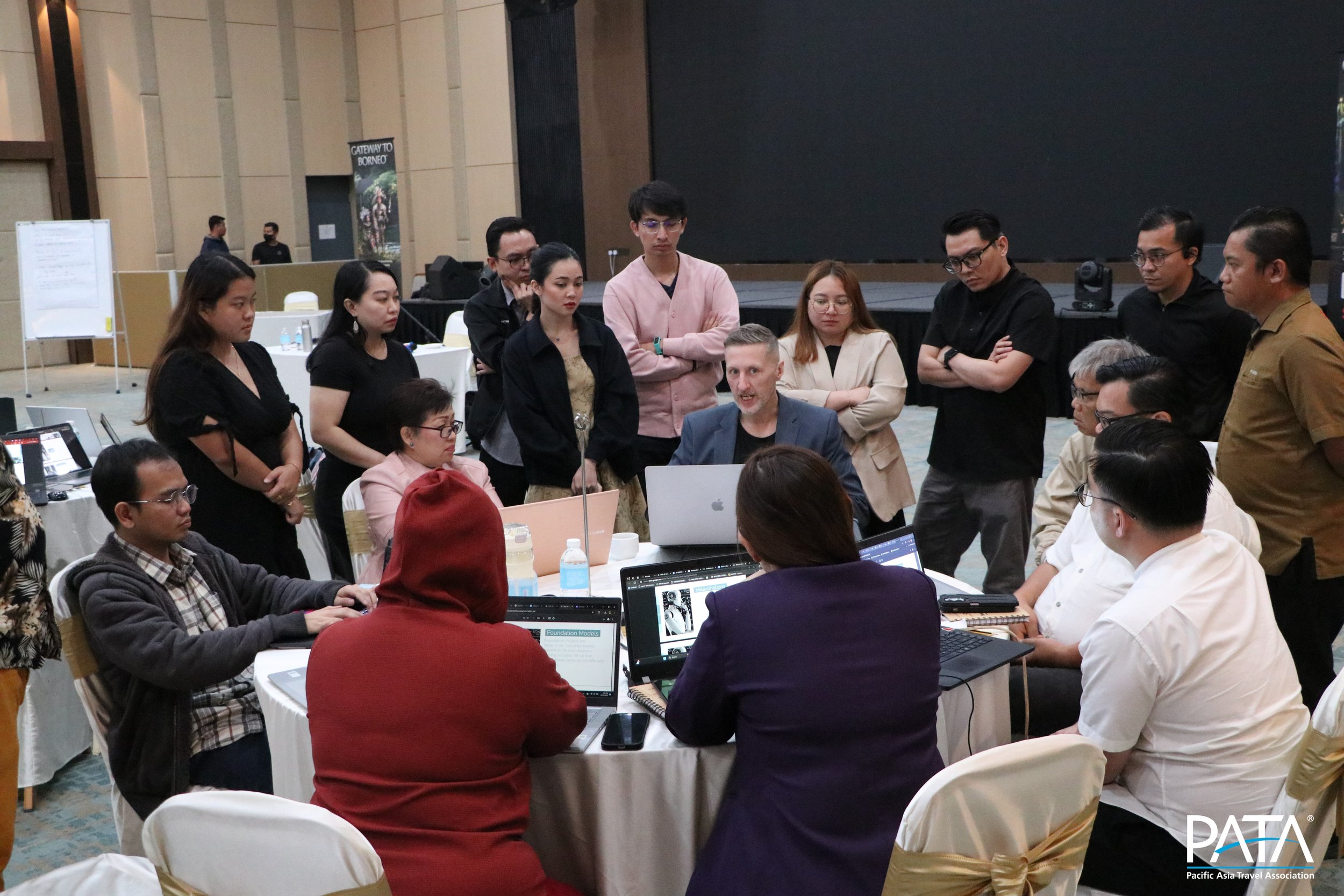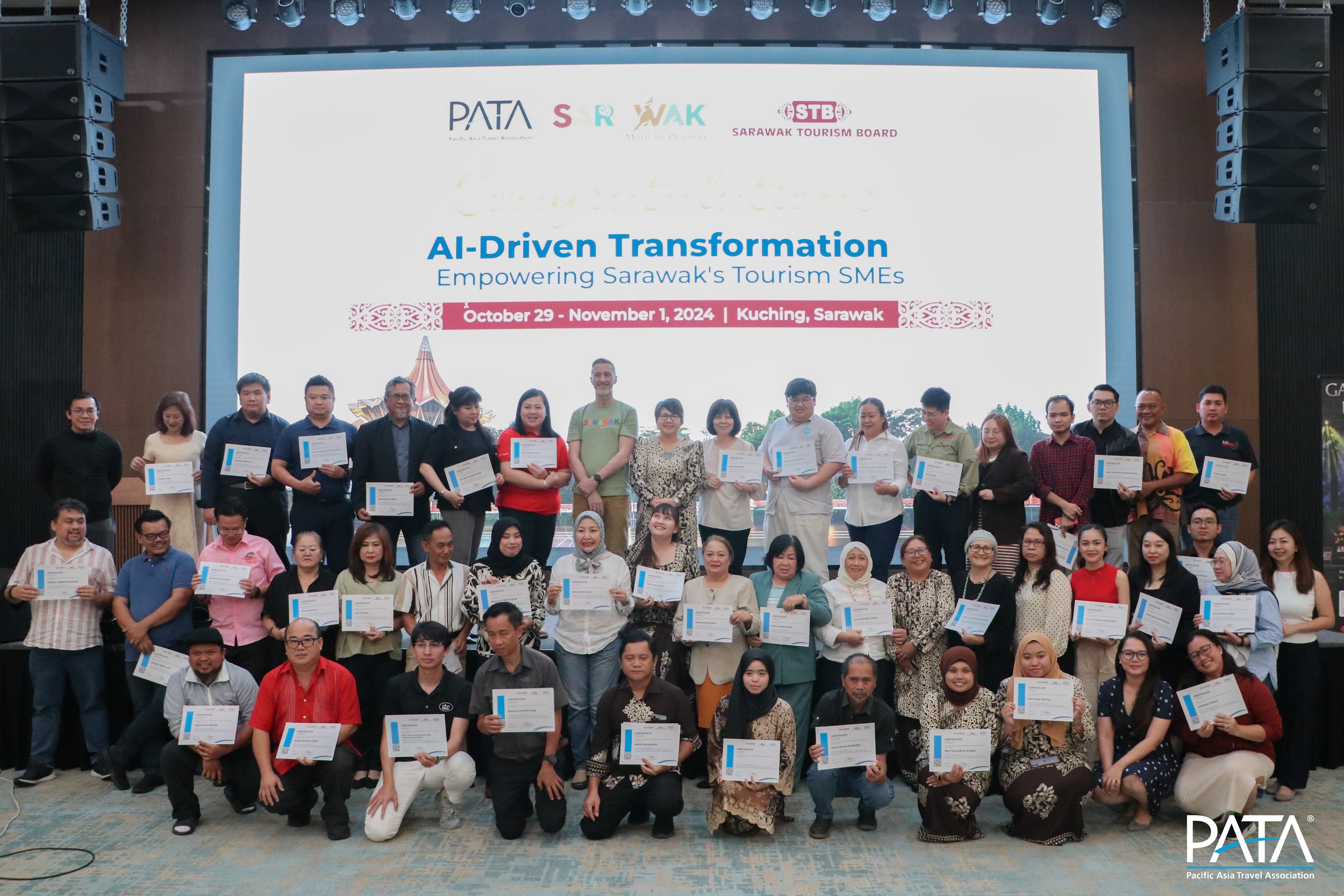PATA Concludes AI Training for Tourism SMEs in Kuching, Sarawak
In May 2024, PATA and the Sarawak Tourism Board (STB) signed a Memorandum of Understanding (MoU) to advance sustainability in Sarawak's tourism industry. The first initiative from this collaboration was the Tourism Destination Resilience (TDR) Programme in Kuching, Malaysia, held from May 20-24. The four-day training programme focused on improving participants’ risk assessment and management skills, and adaptive capacity, as well as finance and digital skills.
Following the success of the TDR programme and participants’ enthusiasm for further hands-on training, PATA and STB introduced a new programme tailored specifically for Sarawak’s local SMEs, with an emphasis on digital skills, particularly in artificial intelligence (AI). The rationale behind this AI-focused training is captured well by the saying, “AI may not take our jobs, but those who know how to use AI will.”* As tourism businesses work to build resilience, AI becomes an invaluable tool, enhancing operations, streamlining customer engagement and enabling data-driven decision-making.
Matt Gibson leads the session, discussing practical AI skills for enhancing local tourism businesses with engaged participants.
The programme 'AI-Driven Transformation: Empowering Sarawak's Tourism SMEs' was implemented at the Theatre Hotel, in Kuching, from October 29 to November 1. The training's goal was to equip local tourism businesses with practical AI skills to better navigate the evolving digital landscape and meet the demands of a competitive global market. It was led by Matt Gibson, CEO of UpThink, an international consultancy firm specialising in AI and WordPress solutions for the travel industry.
Here are some of the programme's highlights:
On Day 1, participants were introduced to foundational concepts in AI, gaining an understanding of its current applications and future potential. The session covered key AI-related terms, such as large language models (LLMs) and prompt engineering, which help participants interact effectively with AI systems. The trainer then demonstrated popular AI platforms used for research, writing, editing, proofreading and translating, highlighting tools such as ChatGPT, NotebookLM, Perplexity and Gemini. Participants had the opportunity to explore these platforms hands-on, experimenting individually and in groups with different prompts to understand how to optimise results. They created practical written content for their businesses, including social media posts, blog articles and other materials tailored to their target audiences, allowing them to see firsthand the efficiency and versatility AI can bring to content creation.
Welcome remark by Sharzede Datu Haji Salleh Askor, the CEO of the Sarawak Tourism Board.
On Day 2, the workshop began with welcome remarks from PATA’s Director of Sustainability and Research, Pavnesh Kumar, followed by opening remarks from the CEO of the Sarawak Tourism Board, Sharzede Datu Haji Salleh Askor. Ms Sharzede highlighted the vital role of collaboration among Sarawak’s stakeholders in advancing the industry towards a more sustainable, resilient, and innovative future and underscored the value of hands-on workshops like this one in achieving that vision.
Following the opening ceremony, participants dove into exploring AI tools designed for creating visual content, focusing on producing high-quality, brand-aligned visuals for advertisements and social media. The training introduced a suite of user-friendly tools, including Canva for design, OpenArt.ai for image generation, Stable Diffusion and Midjourney for advanced artwork, Copilot for creative support, Looka for logo creation, and HeyGen and Napkin AI for video and image enhancements. Participants received guided demonstrations and hands-on practice with each tool to better understand how to apply AI in their promotional efforts.
In a spirited group activity, participants engaged in a friendly competition to create AI-generated images that capture and promote the unique beauty of Sarawak. The exercise not only fostered creativity but also helped participants better grasp how AI tools can enhance their brand storytelling. Here are some of the images that won the popular vote:
The AI-generated image created by the participant who won the popular vote during the event.
The AI-generated image created by the participant who won the popular vote during the event.
The AI-generated image created by the participant who won the popular vote during the event.
Day 3 of the training focused on the usage of AI for workflow optimisation and customer service enhancement through chatbots. Participants explored workflow automation possibilities enabled by low-code tools combined with large language model (LLM) reasoning and a chat interface. Tools covered included Botpress, NotebookLM, Zapier, Make.com, ChatGPT, and Claude. Activities included an overview of the chatbot design and development process, an interactive Botpress chatbot-building demonstration, an introduction to advanced AI agent capabilities, group brainstorming on real-life use cases, and a Botpress chatbot-building and customisation assignment.
Day 4 began with an insightful session on ethical considerations in AI, covering topics such as data privacy, bias prevention, transparency, and the responsible use of AI in tourism. This foundational discussion helped participants recognise the importance of adopting ethical practices when integrating AI into their business operations. The session then shifted to exploring AI applications for sustainability, where participants learned about ways AI can support environmentally friendly practices within tourism businesses. Examples included using AI to optimise energy consumption, reduce waste, and promote eco-friendly options to customers, aligning with global sustainability goals.
For the remainder of the day, participants applied their learning in a workgroup activity. Each group was tasked with creating a campaign to promote a specific tourism business or product in Sarawak, utilising the AI tools introduced throughout the workshop. This exercise encouraged participants to integrate creative AI-generated visuals, chatbot interfaces for customer engagement, and targeted digital marketing strategies into their campaigns, refining their AI-driven strategies for real-world applications.
At the end of the day, each group presented their campaign to a panel of “judges” comprising PATA and STB staff, who provided constructive feedback, evaluating each campaign’s effectiveness, creativity, and use of AI.
Group presentation session as a part of engaging workgroup activity.
The “sharks” from PATA and Sarawak Tourism Board during the presentation (Sharktank session).
The training was attended by 63 participants, primarily from the accommodation sector and tour operators/travel agencies in Kuching. The training received an overwhelmingly positive response, with 98% of participants reporting that the workshop met their expectations and 93% affirming they plan to apply the AI concepts learned in their businesses. Participants particularly appreciated the topics covered in the training, as noted by 80% of respondents, as well as the group activities and exercises, the materials and resources provided, and the networking opportunities. The most preferred topic was AI for visual content generation, which received 55% of the votes, placing it in first place.
Participants proudly hold their certificates at the conclusion of the ‘AI-Driven Transformation: Empowering Sarawak's Tourism SMEs' programme.
PATA extends its sincere gratitude to the Sarawak Tourism Board for their unwavering support and commitment to enhancing the sustainability and resilience of Sarawak's tourism industry. The Association also thanks the trainer, participants and all involved parties for their dedication and contributions to the success of this training.
*The quote was borrowed from Economist Richard Baldwin, who first used the sentence at the 2023 World Economic Growth Summit. Since then, variations of it have been mentioned as people discuss the potential impacts of AI.
Do you have any questions about this AI capacity-building programme or other workshops organised by PATA? Get in touch with us at ssr@pata.org. Also, don't miss PATA Newsletters for updates on this and other sustainability and resilience initiatives.









